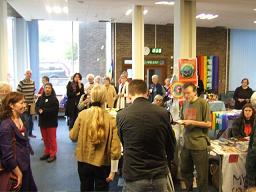![]()
A World Without Fear
Statement on Poverty
Manifestos
Campaigns
» Counter-Terrorism Bill 2008
» Guantánamo Bay
» Dale Farm Travellers’ Site
Archives
» Briefings
» Events
Links
Contact Us
Send this page to a friend
|
Wales Peace Festival 2008 The Wales Peace Festival 2008 was held on 18-19 October at two adjoining Bangor University premises – the Department of Lifelong Learning and the Department of Computer Sciences, to both of whom many thanks. It was sponsored by CND Cymru, Cymdeithas y Cymod and Cynefin y Werin. The local hosts and organisers this year were the Bangor and Ynys Môn Peace and Justice Group. Many other groups and individuals from all over Wales helped to make the festival a success. The economic crisis and recession impacted on many of the discussions and topics featured below. 1. Speakers • PAWB/ Dylan Morgan the campaign against nuclear new build at Wylfa and elsewhere Two postcard campaigns were launched at the Festival, one for the release of Binyam Mohamed from Guantanamo Bay, the other for facilitating overseas study visas for Palestinian students trapped in Gaza, particularly for Zohair Abu Shaban to study at Imperial College, London. 4. Stalls The festival had a busy central forum with a children’s corner and the following stalls: 5. Cultural events • Film Jonathan Ervine showed extracts from the film 11-09-01 September 11th for discussion. 6. Committee discussions A small meeting was held upstairs at the Anglesey Arms to discuss the future of the Wales Peace Festivals, the future direction of Cynefin y Werin, wider collaboration with other movements and organisations in Wales, and the idea of a Wales Peace Institute. It was agreed to progress these discussions at a meeting in Aberystwyrh in the New Year. Kelvin Mason of Aberystwyth Peace Network chaired the meeting, James Maiden of Cynefin y Werin took the minutes. 7. Ways forward Stephen Thomas closed the festival with a concise summary of events and points of action for the future, referring to the agenda of [6]. Festival Report
On Saturday 18 October it was reported that President George W Bush had agreed to intervention in the world financial system only on the condition that ‘democratic capitalism’ was maintained and that the principle of the free market, which had in his view benefiited so many people around the world, was not undermined. The intervention of the USA in world politics, economics and society, to forward a particular agenda, was a thread that ran through many of the lively discussions and talks at the festival. In his address to the conference the next day, Greg Muttitt, of the organisation ‘Platform’, reported on the struggle in Iraq against the privatisation of oil reserves and production. The valiant fight put up by workers, trade unionists and the Iraqi people to maintain ownership of their oil has so far been successful. This struggle has progressed despite the illegal status of union membership in the oil industry (Saddam Hussein’s old law will remain on the statute book), and in the face of threats and bribes by the USA and the IMF concerning debt relief and aid for reconstruction – and of course the enduring presence of US and coalition troops on Iraqi soil. There is now a push to bypass the obstinacy of the Iraqi parliament by signing contracts without a law being passed. This would result in 40 percent of oil reserves and 90 percent of production being handed over to foreign, particularly British, control. Platform maintains that no long-term contracts should be signed until Iraq is free from occupation and its people are allowed to make truly democratic decisions for themselves – a view endorsed by speakers from the floor, who discussed ways in which we could stand by the people of Iraq. Past President of the National Union of Teachers, Mary Compton, drew many connections between the actions of the US and its allied forces in Iraq and interventions by the US and Europe in the struggle for human rights in the Occupied Territories of Palestine. Mary was one of the international team of observers of the election in 2006 that brought Hamas to power. As we know, the results were immediately denounced by Europe and the US and a process was begun of creating new division between Hamas and Fatah, much as has been carried out between the Shia and Sunni communities in Iraq. The extent of the attempted destruction of the rule of law and human rights by the US and Britain was outlined by Moazzam Begg, speaking about his internment in Guantanamo Bay. He and the audience discussed the necessity of naming those members of our government complicit in illegal acts of torture and holding them to account. The campaign was joined to demand that Binyam Mohamed, the last British Resident to be held in Guantanamo Bay, receive a fair trial and that David Miliband disclose documents that would reveal the complicity of the British government in his torture. |
Become a Member of Peace & Progress
The membership fee is £36 / £12 concessions
©
Peace & Progress 2008
Peace & Progress, The Warehouse, 54-57 Allison Street, Birmingham, B5 5TH, United Kingdom
Website developed
by Wordsmith
